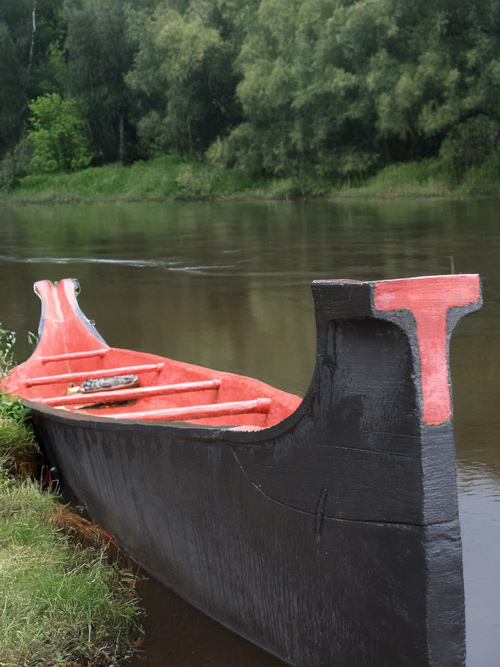The previous night at Fort Clatsop, careless paddlers fail to properly secure the Chinookan canoe, and it floats away with the tide. After the visiting Kathlamets leave to barter with the Clatsops, Lewis briefly describes the Columbia River trade network.
In Washington City, President Jefferson says an Indian delegation—organized previously by Lewis and others in St. Louis—will soon leave.
A Canoe Floats Away
by Yellowstone Public Radio[1]Originally aired weekdays by Yellowstone Public Radio during the Bicentennial observance of 2003-2006. Narrated by Hal Hansen. Scripts by Whit Hansen and Ed Jacobson. Produced by Leni Holliman. © … Continue reading
Chinookan Canoe
This canoe is from an original photo with the creek and forest generated with the assistance of artificial intelligence, © Kristopher K. Townsend 2008 and 2024. Permission to use granted under the Creative Commons Attribution-Share Alike 4.0 International license.
Lost Chinookan Canoe
this morning the Sergt. of the guard reported the absence of our Indian Canoe, on enquiry we found that those who came in it last evening had been negligent in securing her and the tide in the course of the night had taken her off; we sent a party down to the bay in surch of her, they returned unsuccessfull . . . . this will be a very considerable loss to us if we do not recover her; she is so light that four men can carry her on their sholders a mile or more without resting; and will carry three men and from 12 to 15 hundred lbs.
—Meriwether Lewis
Columbia River Trade Network
the Cuthlâhmâhs [Kathlamets] left us this evening on their way to the Catsops [Clatsops], to whom they purpose bartering their wappetoe [wapato] for the blubber and oil of the whale, which the latter purchased for beads &c. from the Killamucks [Tillamooks]; in this manner there is a trade continually carryed on by the natives of the river each trading some article or other with their neighbours above and below them; and thus articles which are vended by the whites at the entrance of this river, find their way to the most distant nations enhabiting it’s waters.
—Meriwether Lewis
Delegation Moves On
Washington Jan. 11. 06
Dear Sir [Benjamin Smith Barton]
In answer to your letter of Dec. 27. I snatch a moment from incessant business & interruption to inform you that the Missouri & Missisipi chiefs will set out in a few days to go as far as New York & perhaps Boston, and consequently will give you an opportunity at Philadelphia of making all the enquiries you desire, & more satisfactorily by yourself than by another. There are 4. Little Osages, 2. Missouris [Missourias], 1 Kanza [ Kansa], 1. Otto [Otoe]. 2 Panis [Pawnees], 2 Ayowas [Iowas], 1 Sioux, 2 Renards [Foxes], 5 Sacs [Sauks] & 1 Poutewatami [ Potawatomi], with 2 interpreters who serve for the whole. Accept affectionate salutations
Th: Jefferson
Weather Diary
aspect of the weather at rise
Wind at rise
Weather at 4 OC. P.M. Wind at 4 OC. P.M. cloudy S. W. cloudy after rain S. W. —Meriwether Lewis[2]To assist the reader, the editor of this web page has omitted the “Day of the month” column and spelled out some abbreviations.
Experience the Lewis and Clark Trail
The Lewis and Clark Trail Experience—our sister site at lewisandclark.travel—connects the world to people and places on the Lewis and Clark Trail.
Plan a trip related to January 11, 1806:

Fort Clatsop is a High Potential Historic Site along the Lewis and Clark National Historic Trail managed by the U.S. National Park Service. The site is managed by the Lewis and Clark National and State Historic Parks.
Notes
| ↑1 | Originally aired weekdays by Yellowstone Public Radio during the Bicentennial observance of 2003-2006. Narrated by Hal Hansen. Scripts by Whit Hansen and Ed Jacobson. Produced by Leni Holliman. © 2003 by Yellowstone Public Radio. |
|---|---|
| ↑2 | To assist the reader, the editor of this web page has omitted the “Day of the month” column and spelled out some abbreviations. |



